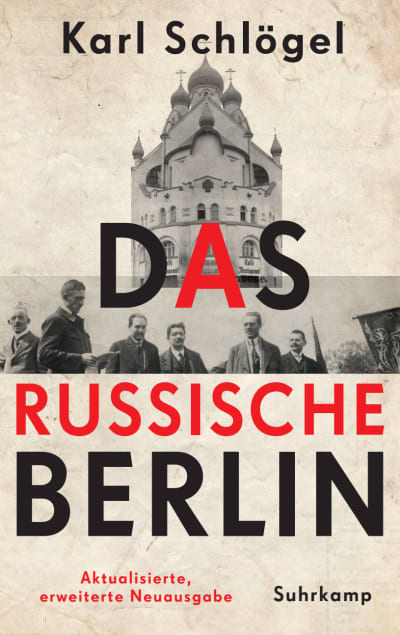Berlin welcomed almost half a million Russian refugees at the beginning of the1920s. In the inter-war period, the city was not only the »stepmother of Russian cities«, but also the secret centre of the world revolution. This is where those totalitarian movements which would mark Europe in the »age of extremes« first ran into one another.
Karl Schlögel uncovers the great within the small. He follows the dramatis personae and reconstructs the networks through which they moved. The...
Berlin welcomed almost half a million Russian refugees at the beginning of the1920s. In the inter-war period, the city was not only the »stepmother of Russian cities«, but also the secret centre of the world revolution. This is where those totalitarian movements which would mark Europe in the »age of extremes« first ran into one another.
Karl Schlögel uncovers the great within the small. He follows the dramatis personae and reconstructs the networks through which they moved. The world of the train stations and the salons of the Tiergarten area of Berlin, the poets of the silver age and the agit-prop artists of Soviet power, receptions at the Soviet embassy and Nabokov’s observations on the rise of the Nazis, taxi drivers’ perceptions of the city and the scandal surrounding the »tsar’s daughter Anastasia«. Timetables and directories play an important role for Schlögel, as do cafés and cabarets, the ceremonial aspects of diplomacy and the practices of the underground struggle, the polyglot world of Comintern-functionaries and the maps of the geo-politicians.
Russian Berlin is no romantic place, but the arena of an age that was both post-war and pre-war in one. Ever since Russia and the European Union have become estranged, the highly interconnected »Russkij Berlin« of the present has been politically divided. The double view of the former as well as current Russian Berlin reveals itself unexpectedly actual and productive.
»Schlögel’s great strength lies in his talent for empathy combined with an encyclopaedic knowledge of German-Russian relations. Through his brilliant essays an image of that very ›Russian Berlin‹ that existed before the rise of Hitler grows before the reader’s eyes.« Peter Merseburger, DIE ZEIT
»A panorama of the intellectual world, not nostaligc but close to today. Every chapter not only talks about Berlin but tears open an intellectual world that once was.« Bernhard Schulz, Der Tagesspiegel
»Schlögel writes beautifully, the material is gripping, the whole illuminates both past and present.« Burkhard Müller, Süddeutsche Zeitung
»A declaration of love to Russkij Berlin.« Der Tagesspiegel
»The great history dissolved into many small, vivid stories. Those who have time to bury themselves in a book can lose themselves in Schlögel’s universes. They are wonderful reading experiences.« André Fischer, Nürnberger Zeitung
»Schlögel’s great strength lies in his talent for empathy combined with an encyclopaedic knowledge of German-Russian relations. Through his brilliant essays an image of that very ›Russian Berlin‹ that existed before the rise of Hitler grows before the reader’s eyes.« Peter Merseburger, DIE ZEIT
»A panorama of the intellectual world, not nostaligc but close to today. Every chapter not only talks about Berlin but tears open...
Persons
Karl Schlögel
Karl Schlögel, born in 1948, taught Eastern European history up until his retirement as professor emeritus, first at the University of Constance, and from 1995 onwards at the European University Viadrina in Frankfurt/Oder. His most important publications include Moskau lesen, Petersburg 1909-1921. Das Laboratorium der Moderne, In Space We Read Time, and Moscow 1937. His book Das sowjetische Jahrhundert. Archäologie einer untergegangenen Welt, published in 2017, received the Prize of the Leipzig Book Fair that year.
Karl Schlögel, born in 1948, taught Eastern European history up until his retirement as professor emeritus, first at the University of...
